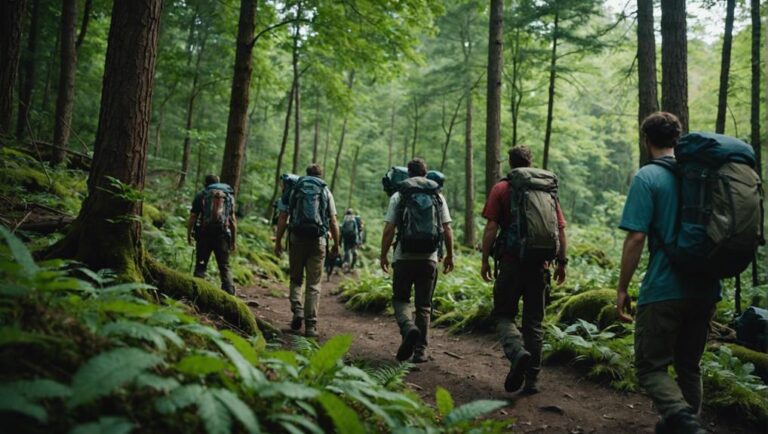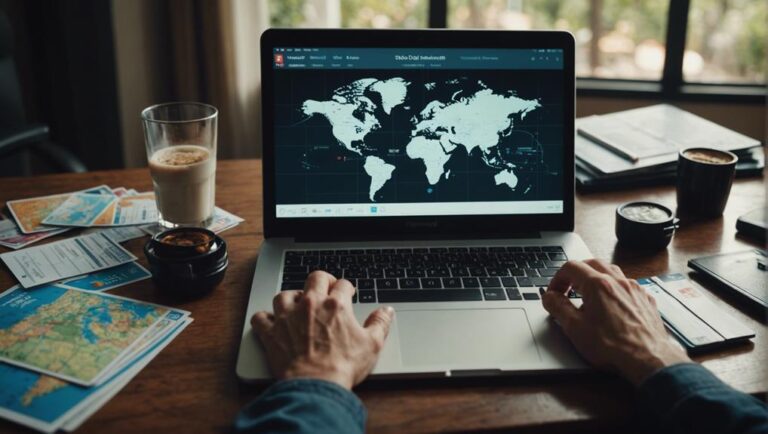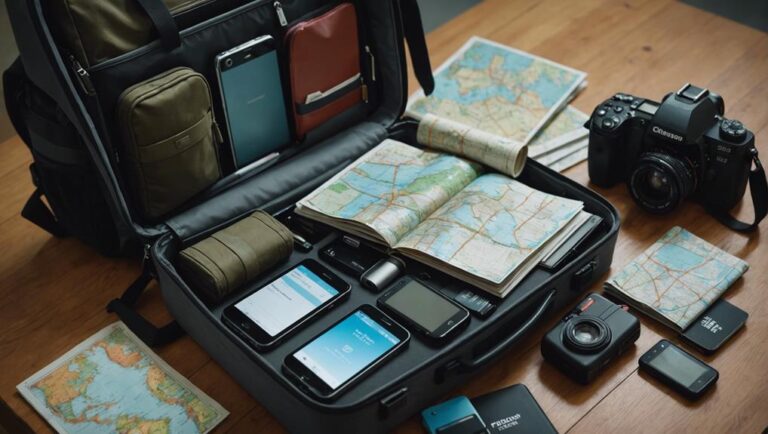Long-Term Travel Planning Strategies
Starting on long-term travel planning? Begin by setting clear goals to guide your adventures and adding purpose to your journey. Craft a detailed budget plan, considering saving strategies and setting up an emergency fund. Develop a flexible itinerary that balances time management and spontaneity, outlining must-see locations. Research destinations thoroughly for a fulfilling experience, considering a mix of activities. Secure long-term accommodations in residential neighborhoods for cultural immersion. Prioritize safety with emergency preparedness and health precautions. Stay tuned for more essential strategies to make your long-term travel planning successful and fulfilling.
Setting Travel Goals
When starting on long-term travel planning, establishing clear and achievable travel goals is essential to guarantee a fulfilling and successful journey. Goal setting is the compass that will guide you through your future adventures, helping you stay focused and motivated along the way.
Begin by defining what you hope to achieve from your travels. Are you looking to immerse yourself in different cultures, explore natural wonders, or simply relax and unwind? Setting specific goals such as visiting a certain number of countries, learning a new language, or trying unique foods can add excitement and purpose to your journey.
Consider the timeframe for your trip and break down your goals into smaller, manageable steps. This won't only make your objectives more attainable but also allow you to track your progress and celebrate your achievements along the way.
Crafting a Budget Plan
Develop a detailed budget plan to effectively manage your finances and guarantee a seamless and stress-free long-term travel experience. Start by implementing saving strategies to make sure you have enough funds for your entire journey. Consider setting aside a specific amount each month dedicated to your travel expenses.
Additionally, track your budget meticulously to stay on top of your spending and adjust as needed.
When crafting your budget plan, take into account your financial resources. Calculate your total income and assess how much you can comfortably allocate towards your travel fund without compromising your essential expenses. It's also important to establish an emergency fund for unexpected situations that may arise during your travels.
Having this safety net will provide peace of mind and financial security throughout your journey.
Developing a Flexible Itinerary
Curious about how to create a travel itinerary that allows for spontaneity while ensuring you hit all your desired destinations? Finding the right time management and spontaneity balance is key.
To develop a flexible itinerary, embrace a mindset of flexibility and adaptability. Start by outlining your must-see locations and activities, then allow room for unexpected discoveries and detours.
When planning your days, factor in some buffer time between activities to accommodate spontaneity. This approach not only prevents feeling rushed but also gives you the freedom to fully immerse yourself in each experience.
Keep in mind that unexpected delays or exciting opportunities may arise, so staying open to adjusting your plans can lead to memorable adventures.
Researching Destinations & Activities
When planning your long-term travel adventure, start by carefully selecting destinations that align with your interests and travel goals. Researching activities and attractions in each location is essential to make the most of your trip and guarantee you don't miss out on must-see experiences.
Destination Selection Tips
As you start on the journey of long-term travel planning, researching destinations and activities is a crucial step in guaranteeing a fulfilling and memorable experience. Begin by considering your travel bucket list – those dream destinations you've always wanted to visit. Narrow down your choices by setting destination criteria that align with your interests and preferences. Think about factors like climate, activities available, cultural experiences, and budget considerations.
Research each potential destination thoroughly. Look into the best times to visit, visa requirements, safety information, and local customs. Consider the types of activities each place offers – whether you prefer relaxing on a beach, exploring historical sites, hiking through nature, or immersing yourself in a bustling city.
Consult travel blogs, online forums, and guidebooks for firsthand accounts and recommendations. Pay attention to reviews from other travelers to get a sense of what to expect.
Activity Planning Essentials
In planning your long-term travel activities, conducting thorough research on destinations and available experiences is essential for creating a well-rounded and enjoyable itinerary. When it comes to activity selection, consider a mix of adventure, relaxation, and cultural immersion to make the most of your journey. Allocate time wisely by prioritizing activities that align with your interests and goals, ensuring a balanced schedule that allows for exploration and downtime.
Exploring local culture is a key aspect of long-term travel. Look for activities that provide insight into the traditions, cuisine, and daily life of the communities you visit. Language immersion can also enrich your experience, offering opportunities to connect with locals on a deeper level and gain a better understanding of the destination.
Effective time management is vital in activity planning. Create a detailed itinerary that outlines each activity, including transportation time and any necessary reservations. Flexibility is important too, allowing room for spontaneous discoveries and unexpected experiences that can truly enhance your long-term travel adventure.
Packing Wisely & Efficiently
Pack your essentials strategically, making sure you have versatile items that can be mixed and matched for different outfits. When packing for long-term travel, space-saving techniques are key. Opt for lightweight, wrinkle-resistant fabrics that can be rolled rather than folded to maximize suitcase space. Choose versatile clothing choices like a classic pair of jeans that can be dressed up or down, or a reversible jacket that can be worn in multiple ways.
Packing items that serve dual purposes, such as a sarong that can be used as a scarf, beach towel, or even a makeshift curtain, will further help you save space. Consider the climate and activities of your destination to pack accordingly, making sure to pack layers that can be easily added or removed. Remember to pack travel-size toiletries and consider investing in packing cubes to keep your belongings organized and compact.
Securing Long-Term Accommodations
When planning your long-term travel, securing accommodations is an important step to guarantee a comfortable and enjoyable trip.
Consider rental options abroad for a taste of local living, explore extended stay alternatives for added convenience, and look into budget-friendly housing solutions to make your journey more cost-effective.
These points will help you find the perfect home away from home during your extended adventures.
Rental Options Abroad
Exploring various rental options abroad is crucial to secure long-term accommodations that align with your travel needs and budget. When searching for rentals in a foreign country, it's vital to contemplate how each option can immerse you in the local culture.
Opting for a homestay, for instance, can provide a unique opportunity to interact with locals, learn about their way of life, and even practice the language, bridging potential language barriers.
Another rental option to ponder is renting an apartment or house in a residential neighborhood, allowing you to experience day-to-day life more authentically. This can enhance your understanding of the local culture and provide a deeper sense of belonging during your extended stay.
Furthermore, these types of accommodations can often be more budget-friendly than hotels, giving you the chance to save money while enjoying a richer cultural experience.
Extended Stay Considerations
Securing long-term accommodations for an extended stay requires careful planning and consideration of various factors to guarantee a comfortable and enriching travel experience. When choosing where to stay for an extended period, opt for lodging that allows for cultural immersion. Living among locals in a residential neighborhood or choosing a homestay can provide a more authentic experience, letting you engage with the local way of life, customs, and traditions. This kind of immersion can greatly enhance your travel experience by giving you a deeper understanding of the destination's culture.
Additionally, seek out accommodations that offer language learning opportunities. Staying in a place where the primary language spoken is different from your own can be an excellent chance to practice and improve your language skills. Whether it's through conversing with your hosts, neighbors, or even just acclimating to daily life in a foreign language, the exposure gained from such experiences can be invaluable for your linguistic development.
Prioritizing these aspects when securing long-term accommodations can enrich your travel experience in ways that extend far beyond just having a place to stay.
Budget-Friendly Housing Solutions
Discover various cost-effective housing options for your long-term stay to guarantee a comfortable and budget-friendly travel experience.
When looking for affordable accommodations, consider hostel stays as a popular choice. Hostels offer shared dormitory rooms or private rooms at lower rates than traditional hotels, making them ideal for budget-conscious travelers.
Another option to explore is house swaps, where you exchange homes with someone looking to visit your area, allowing both parties to save on accommodation costs.
For those seeking a more adventurous experience, camping can be an excellent budget-friendly housing solution. Whether in designated campgrounds or wild camping spots, sleeping under the stars can provide a unique and affordable way to stay during your long-term travels.
Additionally, couchsurfing offers a free accommodation option where locals open their homes to travelers, fostering cultural exchange and new friendships along the way.
Staying Safe & Healthy On The Road
Prioritize your well-being while traveling by equipping yourself with essential safety and health precautions.
When it comes to emergency preparedness, always carry a basic first aid kit, medications, and important documents like your passport and insurance information. Research local health precautions before your trip, such as necessary vaccinations or potential health risks in specific regions. Personal safety is paramount, so be mindful of your surroundings, especially in unfamiliar areas. Consider investing in travel insurance to protect yourself in case of unforeseen circumstances like medical emergencies or trip cancellations.
To stay healthy on the road, maintain good hygiene practices, drink bottled water, and be cautious of consuming uncooked or street food that may upset your stomach. Get enough rest, stay hydrated, and protect yourself from the sun to prevent illnesses.
In crowded areas, safeguard your belongings and be wary of scams targeting tourists. By taking these safety and health precautions seriously, you can enjoy your travels with peace of mind.
Conclusion
To wrap up, as you begin your long-term travel journey, remember to stay focused on your goals, adhere to your budget plan, and keep an open mind to unexpected adventures.
By researching destinations, packing smart, and securing accommodations in advance, you'll be well-prepared for the road ahead.
And always remember, 'keep calm and travel on!' Safe travels!







